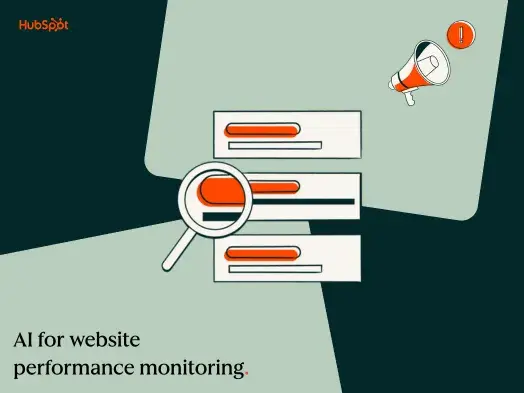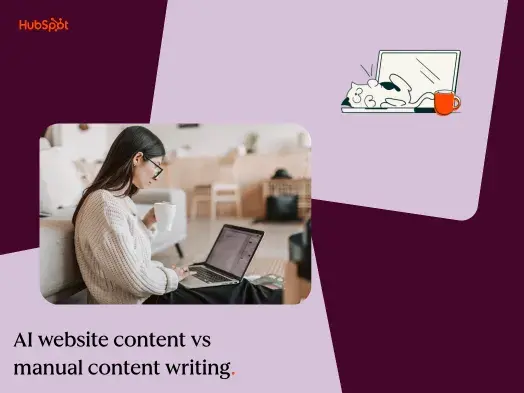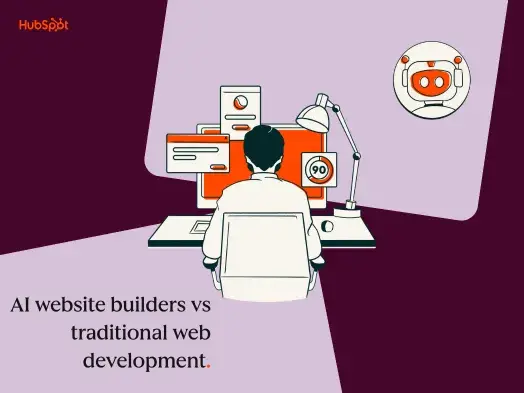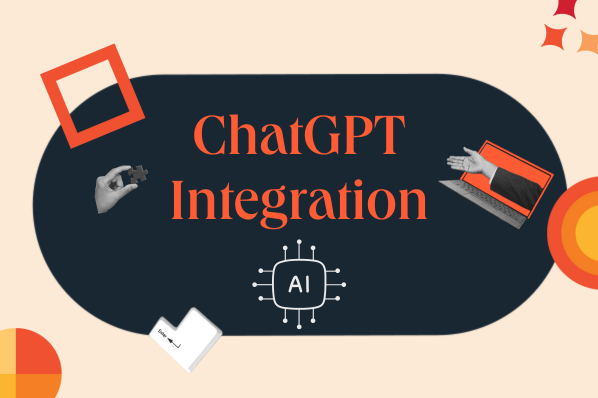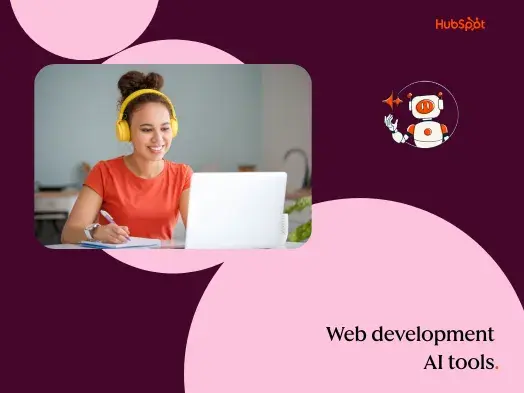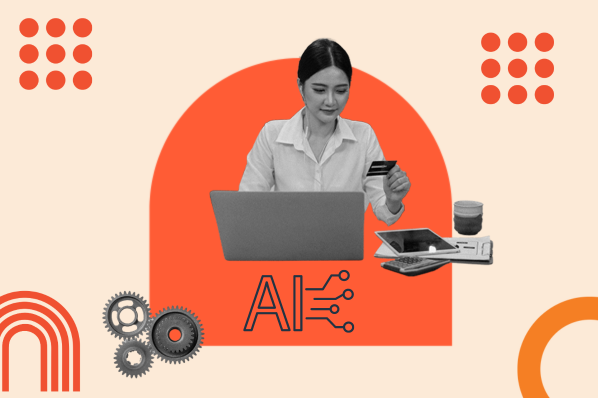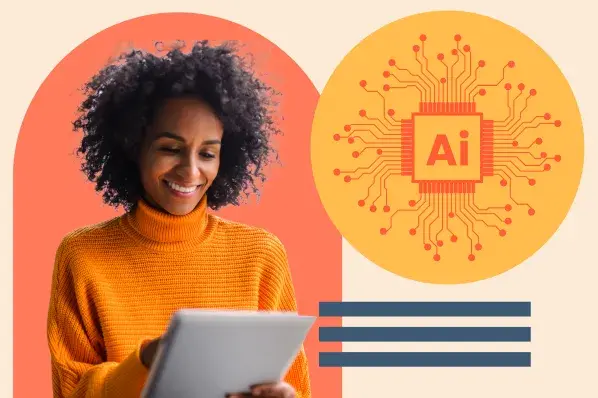What are the pros and cons of AI in website design and development?
Like all new technologies, there are pros and cons of AI in web design and development specifically. First, let's touch on the pros of using AI tools for these purposes.
Pros of AI in Web Design and Development
AI is quickly gaining a reputation as a time-saving resource for designers and developers alike, amongst its other capabilities. Ready to dive into the pros of AI in website design and development? Here's what you need to know.
It makes redundant processes more efficient.
Ask any website designer (or developer, for that matter) if there are certain processes they find redundant and uninspiring, and they're sure to name a few. With the assistance of artificial intelligence-fueled tools, designers and developers can better allocate their time to creative endeavors and let the technology take care of cumbersome, time-consuming tasks.
According to Lindsay Derby, a Senior Product Designer on HubSpot's Sales Enablement team, this is a significant perk that AI design or development tools offer. "In my opinion, one of the most powerful things about AI in web design is standardizing known best practices. Using an AI design tool to help reduce repetitive basic tasks — think: setting up margins, creating filler text, formatting buttons, etc. — frees up time to allow designers to focus on the true strategic and creative design decisions," she shares.
It enables a more personalized user experience.
It's no secret that learning how to master website personalization is important to your users. According to Instapage, 74% of consumers are frustrated when their website content isn't personalized. Therefore, designers and developers not considering AI as a tool to increase personalization are missing out on a significant opportunity to appeal to a broader audience.
Using AI to personalize your website creates a more friction-free experience for your users. And that will fare well for your conversion rate.
It allows designers and developers to understand how users interact with their creations.
Another huge perk of AI web design and development tools? How it can offer up pivotal insight that reveals to designers and developers how their end users are interacting with their creations. Of course, in a pre-AI world, there were opportunities to learn how your end users experience your designs, but it was never as accessible now.
According to Derby, "User research is a huge responsibility, and there is a lot to be done in terms of collecting feedback, analyzing, and synthesizing results. We are already seeing AI tools that help analyze transcriptions for keywords and repeated terms. This can help a designer or researcher move through a lot of content more efficiently and spend their time crafting insights and making decisions based on that feedback."
It could make the internet a more accessible place.
While website designers and developers do their best to build inclusive websites, they sometimes fall short of that goal. However, as AI dev and design tools evolve, they can potentially fill that gap and create a more accessible web experience for all users.
If you want an idea of how AI can be used to fuel accessible digital spaces, check out AccessiBe's AI technology that can make your site easier for screen readers and keyboard navigation. Derby thinks the innovation won't stop there, but AI will continue to be a resource developers and designers can use to create a more inclusive experience.
"I also see a lot of potential in using AI to help improve accessibility across the web," shares Derby. "There are a lot of considerations to remember and implement when designing interfaces that are inclusive and accessible to everyone. I am hopeful that AI will help identify areas in the design that should be improved for accessibility, like automatic tooltips, sizing of icons and characters, screen size adaption, etc."
Cons of AI in Web Design and Development
While there are certainly pros associated with using AI in website design and development, there are also potential drawbacks you should be aware of. Here are some of the cons of AI for website design and development worth keeping in mind.
There aren't currently guidelines around the ethical use of AI.
Let's throw it back to 2010 when Instagram debuted. No one knew how to make it work for their business, or how to do so in an ethically sound way. Expect for AI usage to have a similar learning curve.
"The lack of regulation around AI and the sheer volume of tools in the market, a list that grows every day, means that it is really up to organizations and individuals to use AI ethically," says Derby. "This is a huge responsibility and I don't think everyone will take the time to investigate what it really means to be ethical when using AI, especially when faced with the pressure of shipping designs fast in a rapidly changing market."
Whether you have ethical concerns about the lack of citation of the sources AI is pulling its information from, or are worried about how people will use AI to create deceptive graphics or imagery, your concerns are valid.
There may be a lack of creativity resulting from AI.
Simply put, designs created by AI lack the humanity that you'd get by working with a human designer or developer. Whereas humans bring many experiences to each website they develop or fine-tune user interfaces, AI brings a cookie-cutter lens. Think of it this way: The design or development you want might be less expensive by working with AI, but it may also lack the unique flair that gets it noticed by visitors and keeps them coming back.
"Widespread AI implementation [could result in] an increasingly flat design landscape in digital spaces," says Derby. "By this I mean, websites may start to all look the same as they will follow similar automated patterns. Design professionals will need to work harder to advocate for innovation, taking a chance, and trying something new."
Businesses could make the mistake of replacing designers and developers with AI entirely.
Psst: We've already done a deep dive on why AI is not stealing your job — but let's reiterate that again. "Another risk is the misconception that AI can replace a design professional," says Derby. "Right now, generative AI is a tool like any other. Designers can add to their skillset by using this tool effectively. However, there will always be some who believe that the tool can do the job by itself. This is not only a disservice to designers, but a big misstep for organizations looking to implement AI solutions with little human oversight."
Instead of looking at AI as a replacement for your team's designers and developers, view it as an additional tool they can add to their bag of tricks for smoothing the design and development process.
Besides — you'll still need your team members to do the heavy lifting of inputting the right information into the tools, and their expertise to know how to best use it. "Strategic inputs into an AI tool and then effective use of its outputs is still very much a human job," says Derby. "People who use AI well are going to stunningly outpace people who lean on AI to do it all without human creativity, strategy, and context."
Use AI wisely in website design and development.
Our main takeaway? AI can be a hugely beneficial tool that can streamline or automate tedious, redundant tasks your team dislikes. However, relying on it to do all of your web design and development could prove detrimental, as it currently lacks the human touch that allows your site or app to thrive.
Artificial Intelligence



